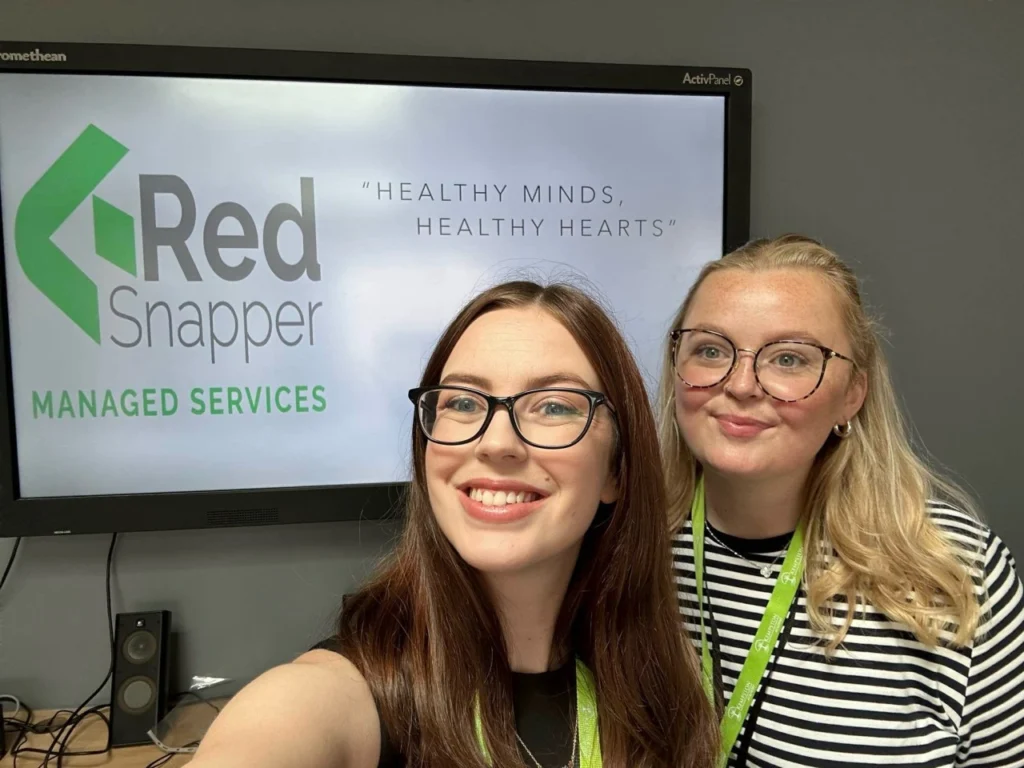
Young Minds, Young Hearts - Relationship Workshops in schools
10/07/2025

Chris English
By Ciara Placentino & Ellie Cole
Ciara has been delivering behaviour change programmes to Domestic Abuse (DA) perpetrators for several years. The feedback she would often get from service users was, “I wish I had learned this in school.” Ellie has a background of working with child victims of DA and has a great passion for early intervention for healthy relationship work.
Our social value project at Red Snapper (RSMS) gives the opportunity to teach future generations what a healthy relationship looks like and provide coping skills to use during difficult times, with the aim of reducing rates of DA in the future. We delivered content to Year 9 students, who will have learned about relationships in the curriculum and may be at the age where they are beginning to get into their first relationships; therefore, early intervention is key.
We delivered one-hour workshops to classes at Kempston Academy in July 2025. The workshops began by exploring what healthy/unhealthy relationships look like and how they make us feel, to gauge the students’ perspectives and understanding. We covered the range of relationship abuse; many people link DA to physical abuse, however, there is a wider range of abusive behaviours, and it is vital these are not minimised.
Through her work with children living in abusive households, Ellie was often asked, “Why do they stay? Why don’t they just leave?” For Ciara, she would hear perpetrators say, “If it was so bad, they would just leave.” Based on this, we decided to explore why victims stay, with the cycle of abuse.
The workshop needed to be interactive for engagement reasons, considering different learning styles and creating memorable learning experiences. Students were given a series of scenario cards for them to discuss in subgroups and sort into either ‘healthy’ or ‘unhealthy’. They covered behaviours such as sexting, controlling behaviours, violent outbursts in arguments, harassment, financial abuse and much more.
It’s important to recognise that some may have already displayed some of these unhealthy behaviours. Research shows that it is not beneficial to shame perpetrators, emphasising the importance of having a non-judgemental stance to understand why they have used such behaviours and provide them with alternative strategies. We discussed why people may use unhealthy behaviours, covering topics like attachment wounds, thinking biases and not managing emotions, stating that although these can lead to unhealthy behaviours, our behaviour is a choice of how we deal with these difficulties. A class discussion was then had about different ways people could cope with challenges, like emotional management, self-care, mindfulness techniques and challenging our thinking.
A common difficulty in relationships is understanding boundaries. A prominent issue in young relationships is children not knowing what their boundaries are, not acknowledging that others will have different boundaries, and potentially lacking confidence in setting and affirming their own boundaries. We provided tips to aid this, like being assertive, using ‘I’ statements and managing our emotions prior to having important conversations. Linking with boundaries was the issue of consent; we discussed that consent is freely given, reversible, informed, enthusiastic and specific. The Tea Consent video was played, clearly highlighting all situations where we need to obtain sexual consent. As it’s slightly obscure, it is a memorable video which helps to embed the learning.
Tea and Consent (British VO version)
We explored the consequences of abusive behaviours, explaining the legal sentences for various forms of abusive behaviours. This was impactful, with some students not realising that sending or receiving a nude photo (of themselves or their peers) is possession and distribution of child pornography, with varying consequences.
Ending the workshop on our feet, the students took part in a true/false quiz to consolidate learning, but in a kinaesthetic way to get students moving around the room. To close, we provided information on support services and gave out feedback forms, which the students completed, ensuring the ability to develop our content to be relevant and impactful. Some feedback we gathered was:
“Many people find it hard to set boundaries because it makes you seem selfish, but this shows that boundaries are good.”
“You learned things that are going to be good for your future.”
The workshop helped to identify potential safeguarding concerns. One student stayed behind to raise some issues at home which the school weren’t aware of, meaning they can now support this.
Ellie noticed a comment made from another student that the content reminded them of their parents. She raised this with the school—something which may have gone under the radar otherwise.
The primary and secondary emotions content resonated with another student. They had not sought support for the difficulties they were experiencing, but the workshop prompted them to speak to their friends and teacher. They spoke to us after the workshop to ask for support with managing their anger.